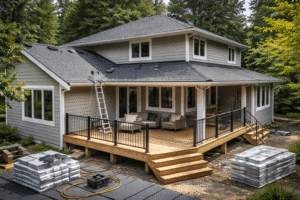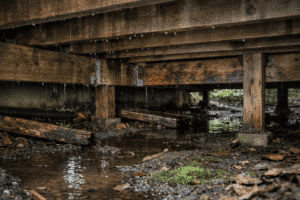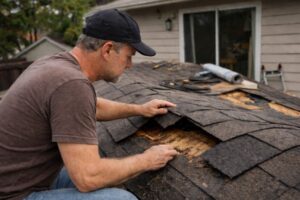If you’re wondering whether your home needs roof repair or replacement, the answer depends on more than just a few missing shingles. The right choice comes down to your roof’s age, damage severity, leak history, and overall cost-effectiveness. Knowing when to patch a problem versus when to start fresh can save you thousands — and protect your home from future issues.
In this guide, we’ll walk you through exactly how to decide between a roof repair vs replacement, including how to evaluate the condition of your roof, what warning signs to look for, and how pricing factors into the decision. You’ll also learn what Washington homeowners should expect when it comes to local climate challenges, material lifespan, and professional recommendations from trusted contractors.
For quick reference, you can explore our related guides:
- Roof Leak? Quick Guide – Learn what to do immediately when you spot a leak.
- Roof Replacement Cost – Understand how much a full replacement might cost in 2025.
By the end of this article, you’ll know how to confidently choose whether a roof repair or roof replacement makes the most sense for your situation — and how to get a professional assessment from a trusted local expert before making your next move.
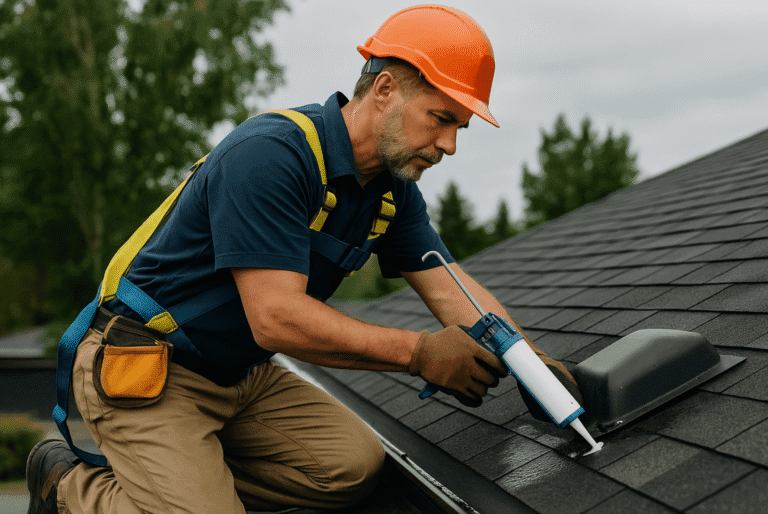
Understanding Roof Repair vs Roof Replacement
Before deciding how to move forward, it’s important to understand what each option truly involves — and how they differ in cost, scope, and long-term results. Both aim to protect your home, but one is a short-term solution while the other provides lasting peace of mind.
What Each Option Means
A repair focuses on targeted fixes for leaks, missing shingles, cracked flashing, or localized damage. It’s best suited when the rest of the roofing system is still in good shape. Repairs are faster and less expensive, making them a smart choice for newer roofs or isolated problems — but over time, multiple small repairs can become costly.
A replacement means stripping away all existing materials — shingles, underlayment, flashing — and installing a completely new roofing system. This ensures structural integrity, improved ventilation, and stronger weather protection for decades to come. It’s ideal for older roofs, widespread deterioration, or major storm damage.
When You’re Not Sure
Many homeowners misjudge the condition of their roof. What looks like a simple leak could be a sign of hidden moisture damage or weakened decking. That’s why scheduling a professional inspection is the safest first step. An experienced roofer can assess whether a quick fix will hold — or if investing in a full roof replacement is the more cost-effective, long-term choice.
Key Factors to Consider Before Deciding
Choosing between a roof repair and a roof replacement comes down to a few practical factors — from your roof’s age and damage extent to long-term goals and budget. Use this quick comparison chart to help guide your decision before calling in a local professional.
| Factor | Roof Repair Makes Sense If… | Roof Replacement Makes Sense If… |
|---|---|---|
| Roof Age | Less than 10–15 years | 20+ years or nearing the end of its warranty |
| Damage Area | Small or localized | Multiple leaks or large sections are failing |
| Cost | Repair is under 30% of replacement | Repeated repair costs are adding up |
| Curb Appeal | Roof still looks uniform and clean | Faded, sagging, or visibly uneven appearance |
| Energy Efficiency | No major ventilation or insulation issues | Noticeable heating or cooling loss |
| Future Plans | Selling your home soon | Staying long-term and want ROI payoff |
Get a detailed quote from a Puyallup roofing contractor to compare both options side by side and make the most informed decision for your home.
Common Roof Damage Scenarios and What They Mean
Not all roofing issues call for a full replacement — but some can’t be solved with a simple patch, either. Here’s how to identify what different types of damage really mean for your roof and when to act before minor problems become costly repairs.
1. Minor Leaks or Missing Shingles
If you notice a small leak or a few missing shingles, a quick repair is often enough to restore protection. In many cases, re-sealing flashing or replacing a few damaged shingles will do the trick. However, if the leak keeps coming back or spreads to multiple areas, it may signal deeper issues beneath the surface.
Tip: Learn how to address small leaks safely in our Roof Leak Quick Guide.
2. Widespread Water Damage or Mold
When water seeps under shingles or into the roof decking, it can cause mold growth, rot, and structural weakening. These problems often go unnoticed until stains appear on ceilings or the attic smells musty. At that stage, roof replacement may be the only way to ensure long-term protection, since repairs won’t fix moisture trapped inside the structure.
3. Storm, Hail, or Wind Damage
Pacific Northwest weather — heavy rain, gusty winds, and the occasional hail — can quickly expose weak spots in older roofs. Strong winds may lift shingles, while hail can crack protective granules, letting water in. If your area just faced a storm, schedule a prompt inspection with a roofing contractor in Olympia, WA
to assess damage early and prevent leaks from spreading.
4. Aged or Curling Shingles
When asphalt shingles start to curl, cup, or crack, it’s a clear sign the roof is nearing the end of its lifespan. UV exposure and weathering make shingles brittle, leading to gaps where water can infiltrate. If your roof is 20+ years old and showing these signs, replacing it now can help you avoid repeated leaks and escalating repair costs later.
Roof Repair vs Roof Replacement Cost
Understanding the cost difference between roof repair vs replacement can help you budget wisely and avoid surprises. On average, minor roof repairs range from $500–$3,000, while a full roof replacement typically costs $10,000–$30,000+, depending on size, material, and roof complexity. Labor usually accounts for 50–60% of the total price.
| Service | Average Cost Range | Best For |
|---|---|---|
| Minor Roof Repair | $500–$1,500 | Small leaks, flashing issues |
| Moderate Repair | $2,000–$4,000 | Partial section repair |
| Full Roof Replacement | $10,000–$30,000+ | Aged or failing roof |
| Premium Roof Replacement | $30,000–$50,000 | Metal, slate, or composite materials |
How to Tell When Repair Isn’t Enough
Even well-timed repairs can only go so far. At some point, the damage or age of your roof may make replacement the smarter — and more cost-effective — choice. Here’s how to recognize the difference between a roof that still has life left and one that’s ready to be replaced.
Signs You Need a Full Roof Replacement
- If your roof shows these warning signs, it’s likely beyond the point of repair:
- Frequent leaks even after multiple fixes.
- Granule loss, curled, or cracked shingles across large sections.
- Sagging roof deck or visible daylight in the attic.
- Higher energy bills due to poor insulation or ventilation.
These issues suggest your roofing system — not just the surface — is failing, meaning repairs will only delay the inevitable.
When Repair Still Works
A roof repair is still a solid option when:
- You’re dealing with a small leak or missing shingles on an otherwise healthy roof.
- You plan to sell soon and just need a short-term fix to maintain curb appeal.
In these cases, a quick, professional repair can save money and buy you time before a full replacement becomes necessary.
| Roof Condition | Repair or Replace? | Why |
|---|---|---|
| One small leak or missing shingles | ✅ Repair | Localized damage, easy to fix |
| Multiple leaks or water stains indoors | ❌ Replace | Indicates widespread moisture intrusion |
| Roof under 15 years old | ✅ Repair | Still within typical lifespan |
| Roof 20+ years old | ❌ Replace | Nearing end of service life |
| Curled or cracked shingles | ❌ Replace | Shingles are failing structurally |
| Good appearance, no sagging | ✅ Repair | No structural issues detected |
Professional vs DIY Roof Repair
Why Professional Evaluation Matters
When it comes to deciding between roof repair vs replacement, a certified roofing professional brings insight and precision that DIY inspections often miss. Hidden moisture, deteriorating underlayment, or subtle structural damage can go unnoticed — until they cause costly problems later on.
At Orca Roofing & Exteriors, every inspection is performed by licensed and insured roofers who follow strict safety protocols. We use high-quality materials, document every issue with photos, and provide transparent recommendations — whether your roof only needs a minor fix or a complete system replacement.
Ready for peace of mind?Request a free inspection from a Gig Harbor roofing contractor today and get a clear, honest assessment of your roof’s condition.
Long-Term Benefits of Roof Replacement
Choosing a full roof replacement isn’t just about fixing current issues — it’s about investing in your home’s future. A new roof offers:
- Higher energy efficiency and resale value, thanks to modern materials that improve insulation and curb appeal.
- Advanced roofing options like architectural asphalt, metal, or composite shingles that perform better and last longer than older systems.
- Peace of mind from new warranties, proper attic ventilation, and enhanced protection against Washington’s heavy rain and wind.
Discover more material options in our Types of Roof Shingles guide.
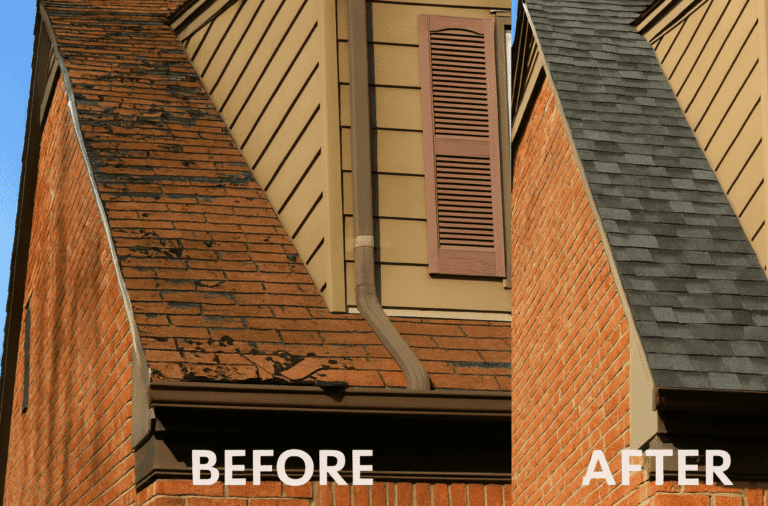
When in Doubt, Get a Professional Inspection
Still unsure whether your roof needs repair or replacement? The smartest next step is a professional roof inspection. At Orca Roofing & Exteriors, we provide honest, data-driven assessments backed by local experience across Bellevue, Kirkland, Gig Harbor, Puyallup, and Olympia.
Our licensed team will evaluate your roof’s condition, document any issues, and recommend the most cost-effective solution — no upselling, just transparency and expertise.
FAQs – Roof Repair vs Replacement
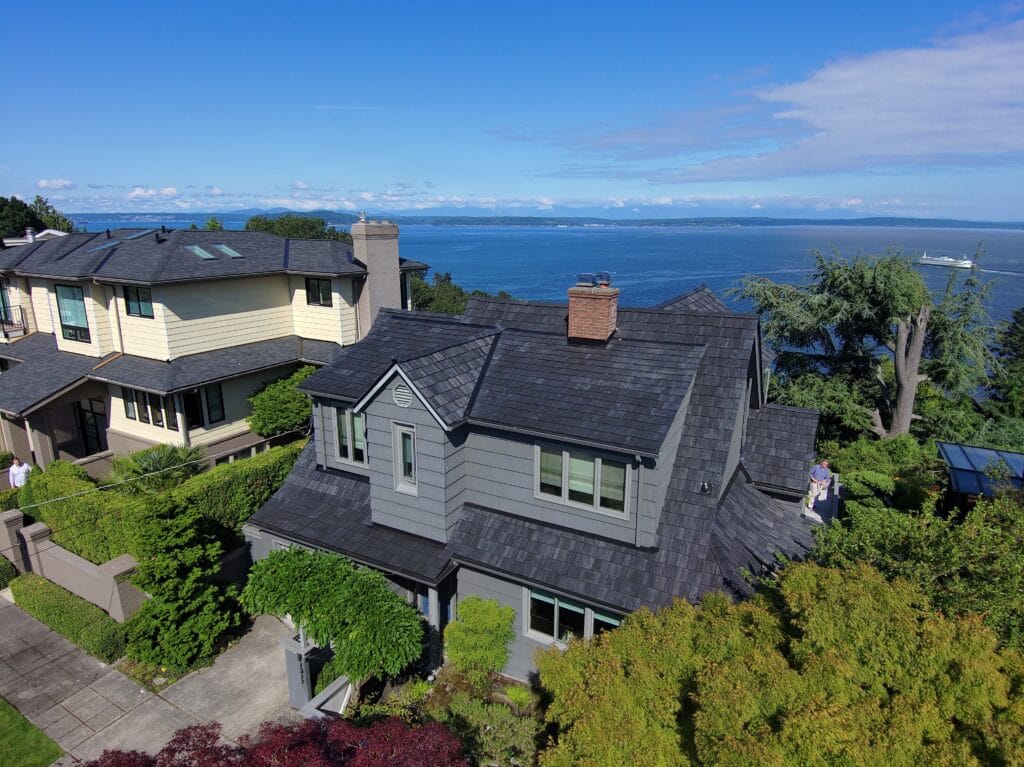
How do I know if I need roof repair or replacement?
If your roof has minor leaks, missing shingles, or small areas of damage, a repair may be enough. However, if you notice recurring leaks, widespread water stains, or sagging, it’s often more cost-effective to replace the entire roof. A professional inspection can confirm the true extent of the issue before you invest in either option.
How long does a typical roof repair last?
Most roof repairs last 5–10 years, depending on the material and overall roof condition. If your roof is already nearing the end of its lifespan, even a solid repair may only serve as a temporary fix — that’s when a full replacement becomes the smarter long-term choice.
Does roof age matter more than visible damage?
Yes. Roof age is one of the most important indicators. Even if your roof looks fine, materials like asphalt shingles begin to lose effectiveness after 20–25 years. Older roofs are more prone to leaks and insulation problems, making replacement a better investment.
Can I repair part of my roof?
In some cases, yes — especially if damage is localized. Partial repairs can restore function without the cost of a full replacement. However, it’s often difficult to match colors and materials perfectly, so repairs may be noticeable on older roofs.
What’s more cost-effective long-term?
If repairs exceed 30% of a full replacement cost, replacing your roof usually saves money over time. You’ll avoid repeat service calls and benefit from improved efficiency, warranties, and longevity. Compare costs in our Roof Replacement Cost
How soon can a professional inspection be scheduled?
Orca Roofing & Exteriors offers fast, local inspections — often within just a few days. Whether you’re in Bellevue, Kirkland, Gig Harbor, Puyallup, or Olympia, our licensed team can quickly assess your roof and help you make a confident decision.
